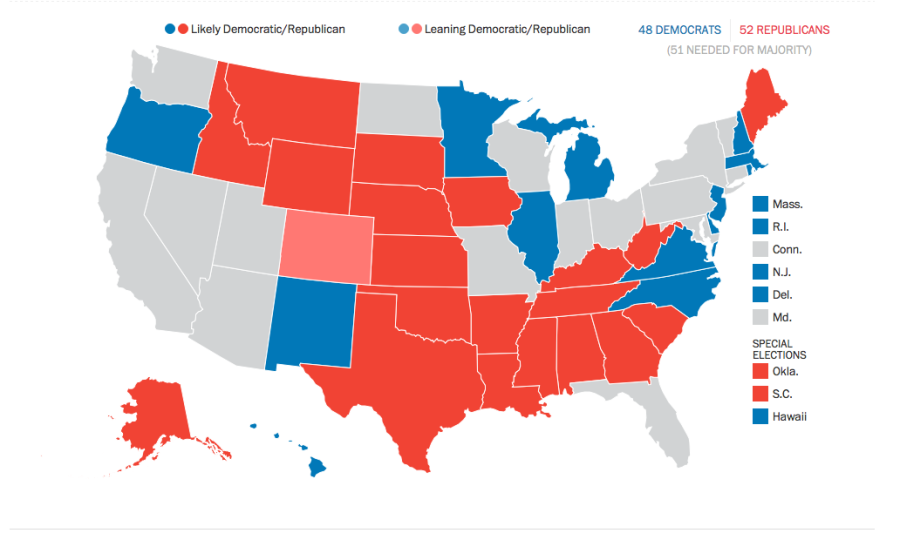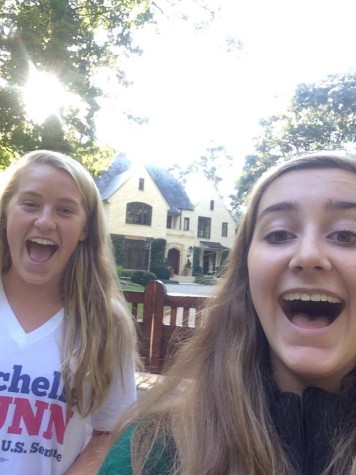Georgia midterm elections watershed for national politics
A few weeks ago, it was green versus blue at the Battle of Buckhead. Now, on Nov. 4, it will be red versus blue as the Republicans and Democrats try to win seats in Congress and the governor office.
Midterms are general elections that are held two years after the presidential election. All 435 seats in the House of Representatives, 36 seats in the Senate, 36 governor offices, as well as some local public offices are up for election this year.
Currently in the House there are 233 Republicans, 205 Democrats, and 3 vacant seats. In the Senate there are 45 Republicans, 53 Democrats, and 2 Independents, who caucus with Democrats.
Many political analysts believe that this year’s midterms favor the Republicans. Historically, only about 40 percent of eligible voters turnout for the midterm elections, and this turnout usually consists of older and white citizens, who favor the Republicans. English teacher Kristin Hunter believes that the lower turnout rate is due to a lack of knowledge of the candidates.
“I worry that people don’t take time to educate themselves about the particular candidates running,” said Hunter. “This year’s senate race is a particularly important race for the future of Georgia. It’s crucial and our responsibility to educate ourselves.”
History teacher Joe Tribble believes that turnout will diverge from that of previous years.
“I think that this year’s midterm turnout will be different,” said Tribble. “People are energized, especially in North Carolina, Georgia, and Colorado.”
Midterms also typically favor the minority party, as the presidential party generally loses seats in the House. Only in 1934, 1998, and 2002, has the majority party made gains in the House. Furthermore, Obama is not popular with the American public, with an approval rating around 41 percent.
“Obama’s approval rating is very low,” said senior Evan Katz, “but I don’t think it will be a major effect as the people who already dislike him will just still vote against his party.
Some will be more influenced by certain policies of the candidates than the president’s popularity.
“If I could vote,” said junior Colesy Cotter, “the policies that would sway my vote would be equal pay for women, healthcare, gay marriage, better environmental regulations, and repealing the Cuban embargo. I think that our country needs to start moving forward again; equality of all people should be our first priority.”
Hunter, on the other hand, thinks that education is a very important policy.
“Anything that has to do with education and feeling like there is a candidate that understands the way education profoundly affects those who live in underserved areas will affect my vote,” said Hunter. “Also, I would like a candidate whose experience seems rooted in the reality of people in this state, has a background in service, and is committed to truly bipartisan work as opposed to ongoing dissension that is happening in Congress right now.”
Some, however, might not be at all influenced by any policies before the elections, unless it is something that changes the status quo.
“Nothing will probably influence my vote. I know who I will vote for,” said Tribble. “However, someone who reverses the current economic path we are currently on might change my vote. We have had six years of a sluggish economy, very high taxes, rising costs of living, and high unemployment rates. Defense matters as well could influence me, as the shrinking size of the army and navy alarms me.”
In the House, the Republicans are predicted to keep control, as there is geography and gerrymandering bias in their favor. In the Senate, the Republicans are predicted to win control. A third of the seats are up for election, and the Democrats hold 21 of those 36 seats. It will be more difficult for the Democrats to defend those seats than for the Republicans to win them over. Both the New York Times and the Washington Post believe that the Republicans have a 60 to 70 percent chance to win the Senate.
“Some people think that if the Republicans take over the Senate that it might be the end of immigration reform. However, others think the opposite,” said Tribble. “There might be greater energy independence? Who knows? But I think that for sure, there will be a concentrated effort to limit the effects of Obamacare if not completely overturn it. The Republicans might flex their muscle, but the president still has to sign the bills, so who knows what will happen.”
Katz thinks it might be a good thing if the Republicans take the Senate.
“I think that there will be less gridlock,” said Katz, “as Congress will be controlled by a single party.”
Westminster teachers and students have been involved with upcoming midterm elections, specifically the campaign of Michelle Nunn, the Democratic Party nominee in the Senate race. Junior Vivienne Reed worked with Nunn’s campaign over the summer.
“My mom is in the same Christian women group as Nunn,” said Reed. “ I started working as the drink person at political parties and then I got involved in the campaign.”
During the summer, Reed processed checks and did phone banking in the finance department.
“It was eye opening,” said Reed, “to see the inner workings of politics.”
Hunter also learned much while working with the Nunn campaign.
“I’ve learned a great deal listening to the [Georgia Senate] candidates and realized that Perdue comes much more from a business background and Nunn comes from a service background. I’ve also realized in past elections that I’ve been guilty of not spending enough time to educate myself.”






